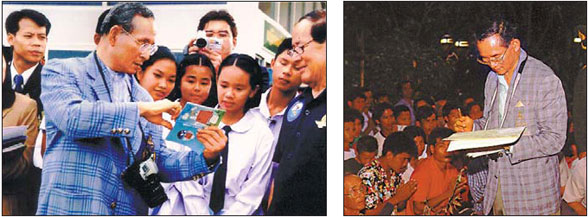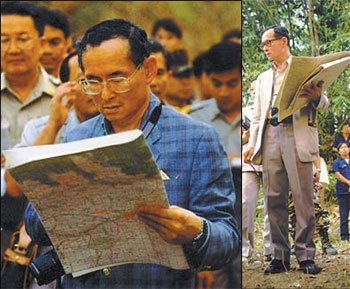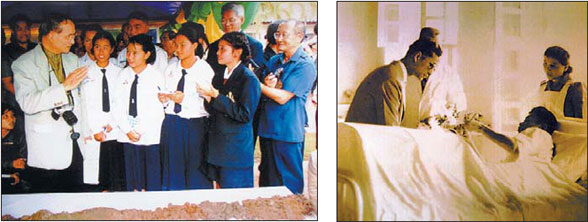The people's king

His Majesty King Bhumibol Adulyadej has developed a variety of special programs to assist people in Thailand in need. Providing medical aid is one of the ways he is making a big difference.
Health
Since 1965, whenever His Majesty King Bhumibol Adulyadej visited the countryside, he brought along his Royal Medical Unit to treat people in the villages. For those requiring extensive treatment are transferred to a hospital during which they would be under His Majesty's patronage and receive royal sponsorship for both medical and household expenses while hospitalized.
In addition, clinics have been set up near his palaces throughout the countryside to provide free healthcare services to villagers. All medical units are staffed by royal or military physicians or by other Royal Medical Division personnel.
In recent years, the work of the Royal Medical Team has been expanded to cover more than general care. The Royal Medical Teams are now augmented by specialists who treat dental, eye, ear, nose, and throat problems. Others concentrate on allergies. They either work on their own or assist physicians in provincial hospitals.
Follow-up on patients is conducted by staff from Her Majesty the Queen's Personal Affairs Division who monitor the patients' recovery until they are fit enough to return home. The division also provides funds to aid patients until they are able to return to work.
To aid military and civilian personnel wounded in the line of duty, His Majesty in 1968 financed the establishment of an Artificial Limb and Vocational Workshop at the Phra Mongkutklao Hospital in Bangkok.
In 1982, as part of his goal of creating rural self-sufficiency in health care, His Majesty launched a program to train village health personnel. Selected villagers take part in medical training programs to become paramedics capable of handling ordinary ailments and first-response emergencies.
In addition, they offer simple preventative medicine and nutrition advice to fellow villagers, especially pre-natal care to ensure healthy births.
Education

Understanding that education is vital to enabling citizens to improve their lives, His Majesty King Bhumibol Adulyadej has been engaged on a number of fronts to promote formal learning, especially for disadvantaged, handicapped, and minority children.
He began by constructing schools in the remote countryside. Between 1952 and 1970, His Majesty's education foundation established eight schools for needy primary and secondary school children, primarily in the North.
His Majesty's Educational Fund also built four welfare schools in the Bangkok suburbs to which many rural people have migrated in search of better incomes. In addition His Majesty built schools in border areas affected by military conflicts. These schools were staffed by trained military or Border Patrol Police. And between 1963 and 1974, His Majesty built nine schools for children in remote hilltribe villages, as well as 31 schools for children of Royal Forestry Department officials and employees.
With his personal funds, His Majesty initiated construction of temple schools, staffed by monks to teach poor children and orphans. Other schools were built to teach children of parents affected by leprosy, and to educate physically handicapped and developmentally delayed children.
Schools have also been erected in response to national emergencies. After the tsunami struck the south in 2004, His Majesty rushed funds to the affected areas to re-build four schools in the provinces of Phang Nga, Phuket, Krabi, and Ranong.
Sensing that there was a pressing need for vocational training, His Majesty established the open vocation schools in 1975 to provide professional training to indigent students. Open to everyone, it began by providing electronics and radio training at the Royal Household Bureau in Bangkok. Encouraged by its success, it was later expanded to include radio repair, welding, construction, and electrical skills in its curriculum.
To enable worthy students to advance their education to the tertiary level, His Majesty King Bhumibol Adulyadej in 1965 revived the tradition of the King's Scholarship which had been set up by his Grandfather, His Majesty King Chulalongkorn early in the century. Each year His Majesty funds a group of students to pursue their studies in any university anywhere in the world.
In keeping with the times, the Distance Learning via Satellite Foundation, launched in 1995, links classrooms in His Majesty's private school, Wang Klai Kangwol in Hua Hin, with those in all regions of Thailand.
It ensures that the same quality education being delivered to students in urban elite schools was available to students in rural areas. Recognizing the value of the programs, governments in Yunnan, the People's Republic of China, Cambodia, Laos, Myanmar, and Vietnam requested the broadcasts to be beamed to students in their countries. Several schools and universities in these countries have also received royal grants to purchase distance-learning equipment.
In large part, as a result of his pioneering efforts and his inspiration, children throughout the Kingdom are afforded a quality education, regardless of their circumstances. The results are most graphically illustrated by statistics. In the mid-1940s, the literacy rate stood at 50 percent. Today, over 95 percent of the country's 63 million citizens are literate.

(China Daily 12/05/2007 page22)














